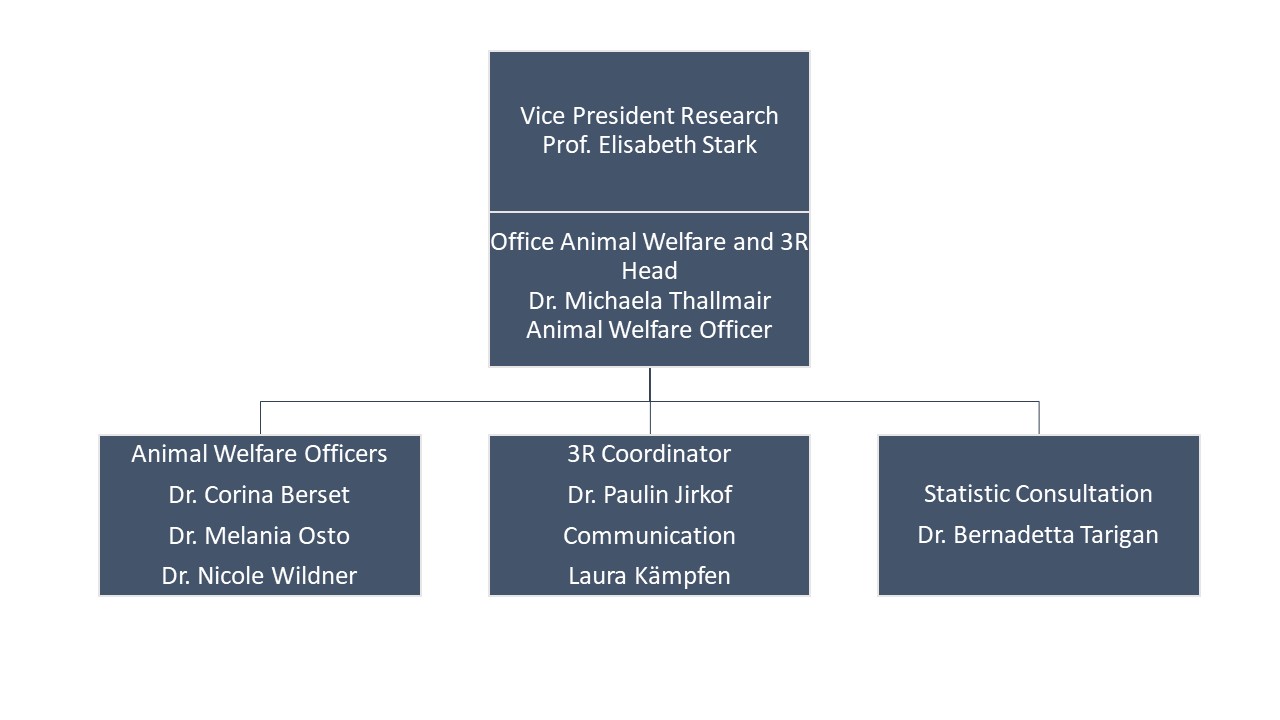Office for Animal Welfare and 3R
Animal experiments at UZH: Our mission statement
Biomedical research plays an important role at the University of Zurich (UZH). Many experimental questions in this research area still rely on animals, e.g. cells or organs need to be taken for primary cell culture, organotypic slice or biochemical experiments or in vivo experiments need to be performed since the research aim can only be tested in an entire organism.
The University of Zurich (UZH) is now one of the world's leading institutions in many life science fields. Biomedical research has always been associated with animal experiments. Although the development of new methods has been able to replace many animal experiments, replacement is not yet foreseeable in many important areas, especially in research areas where complex interactions are studied in the whole organism.
The UZH is aware that animal experiments are only accepted with reservations by large sections of the population. It has therefore committed itself to rigorously implementing the ethical principles and guidelines for experiments on animals of the Swiss Academy of Medical Sciences and the Swiss Academy of Sciences. The UZH also supports the goals of the Basel Declaration. Laboratory animal husbandry and scientific animal experiments at the UZH must be exemplary and must comply with both legal regulations and internal guidelines. Special attention is paid to the implementation of the 3Rs, i.e. the replacement of animal experiments by alternative methods ("replace") whenever possible and reasonable, the optimisation of the number of animals used in animal experiments ("reduce") as well as the continuous improvement of experimental and husbandry conditions ("refine").
In summary, animal welfare and the 3Rs should be taken into account through exemplary animal husbandry, appropriate training of the persons involved, careful experimental design and the use of all possibilities to reduce animal suffering. The Office for Animal Welfare and 3R, consisting of the Animal Welfare Officers, a 3Rs coordinator and a biostatistician, support the members of the UZH in implementing these requirements. It reports to the Vice-President Research.
Organisational chart

Team Office for Animal Welfare & 3R

The following tasks are the responsibility of the Animal Welfare and 3R Office:
Support and advice
The Animal Welfare Officers, the 3Rs Coordinator and the Biostatistician support researchers in the planning and implementation of experiments. Special attention is paid to the "3Rs" (replace, reduce, refine). The Animal Welfare Officers advise the researchers on the preparation of applications for animal experiments (see TSchV Art 129 and 129a) with the support of the 3R Coordinator and the Biostatistician. All applications are critically reviewed and evaluated by the Animal Welfare Officers before they can be submitted to the Cantonal Veterinary Office. The 3R Coordinator is responsible for coordination between UZH and the Swiss 3R Competence Centre. She promotes the implementation and enforcement of 3RCC initiatives. The Biostatistician offers support in the statistical design of animal experiments, i.e. in the biometric planning for animal experiment applications.
The Office for Animal Welfare & 3R
- is the contact for all persons involved in animal experiments
- advises investigators on the planning of experiments, in particular on the reduction of suffering in laboratory animals, biometric planning and methods for the reduction or replacement of animals in experiments
- suggests improvements in the field of animal husbandry and experimental design
- supports researchers in the creation of monitoring protocols and the definition of termination criteria (humane endpoints)
- assists researchers in the preparation of licence applications and reports for the approval authorities
- arranges contacts between research groups using similar experimental set-ups and external experts
- advises people who carry out animal experiments on training and further education and refers them to existing courses and internships
- organises its own teaching and further education courses and participates in training and further education courses of the Institute of Laboratory Animal Science and other institutions
- supports project managers in informing UZH staff and outsiders (e.g. the press) about the experiments
- supports the Vice-President Research in planning tasks in the area of animal experimentation / animal husbandry and 3Rs
- is available to the Cantonal Veterinary Office and the Cantonal Commission for Animal Experiments as a contact
- can make proposals to authorities and specialist organisations (e.g. adaptation of guidelines)
Training and education of researchers and animal care personnel
The staff of the Office for Animal Welfare and 3R participates in the training of specialist personnel for animal experiments (e.g. LTK modules EGA, 2, 6, 11, 13, 14, 21, 23 or research group-specific seminars on specific topics) and provides practical support. In particular, they support the transfer of experience and skills between research groups. The 3Rs Coordinator initiates training and further education on the topic of the 3Rs and ensures that the 3Rs are given appropriate consideration in degree courses. more information
Internal inspections (post-approval monitoring)
Animal husbandry and experimental procedures at the UZH should be exemplary. The animal welfare officers monitor compliance with the statutory animal welfare requirements as part of quality management. Violations of animal experimentation legislation or licensing requirements are not tolerated. As independent experts, the animal welfare officers report directly to the Vice-President Research and are the contact person for the Cantonal Veterinary Office in Zurich and the Animal Experimentation Commission.
The Office for Animal Welfare & 3R
- carries out internal controls of animal husbandry and animal experiments ("post-approval monitoring") and randomly checks compliance with animal protection legislation and animal experiment licenses, including the correct documentation of interventions and observations
- accompanies members of the Veterinary Office Zurich or the Animal Experimentation Commission during inspections of UZH animal husbandries or animal experiments, if hygiene regulations permit
- is informed by the authority about deficiencies in animal husbandry or in the performance of experiments
- has unrestricted rights of access and inspection of files
- suggests improvements in the field of animal husbandry and experimental design
- is authorized to issue instructions to the researchers
- informs the Deans or the Vice-President for Research in the event of persistent or repeated shortcomings or disagreements
- mediates between parties involved in animal experiments in the event of differences of opinion on animal protection and/or animal welfare
In case of severe shortcomings or suspected violation of the UZH animal welfare policy the Animal Welfare Officers will act as follows:
- They inform the fallible person, the study director and the resource manager. Measures to eliminate the problems/shortcomings will be discussed with the study director and/or resource manager.
- In the case of deficiencies relevant to animal welfare, the institute's director, the dean of the corresponding faculty and the Vice President Research can also be informed
- The specific course of action may be determined on a case-by-case basis in conjunction with the Deans/Vice President Research and LASC representatives as appropriate.
- Until a compromise settlement is reached, the AWOs can stop the provision of experimental animals for the objectionable experiment or stop the experiments in general in case of violation of the animal welfare legislation.
- In case no settlement is reached, agreed measures are not taken or deadlines are not kept, the AWOs will inform the Vice President Research. The VP Research will - after hearing the study director and/or resource manager - decide on the measures or procedures to be taken and will inform the study director, resource manager and the AWOs about the decision.
- In case the mandated measures/procedures are not fulfilled in a timely manner, or the animal welfare legislation was violated; the AWOs can involve the Legal Services of the UZH. Legal Services can report to the Cantonal Veterinary Office according to §9 of the Cantonal Animal Welfare Legislation.
Public Relations
The Office for Animal Welfare and 3R is also involved in UZH's public relations work with regard to questions about animal experiments, 3Rs and animal husbandry. It also organises guided tours of animal husbandry facilities and lectures as part of the UZH Laboratory Animal Day or school projects or for interested persons.